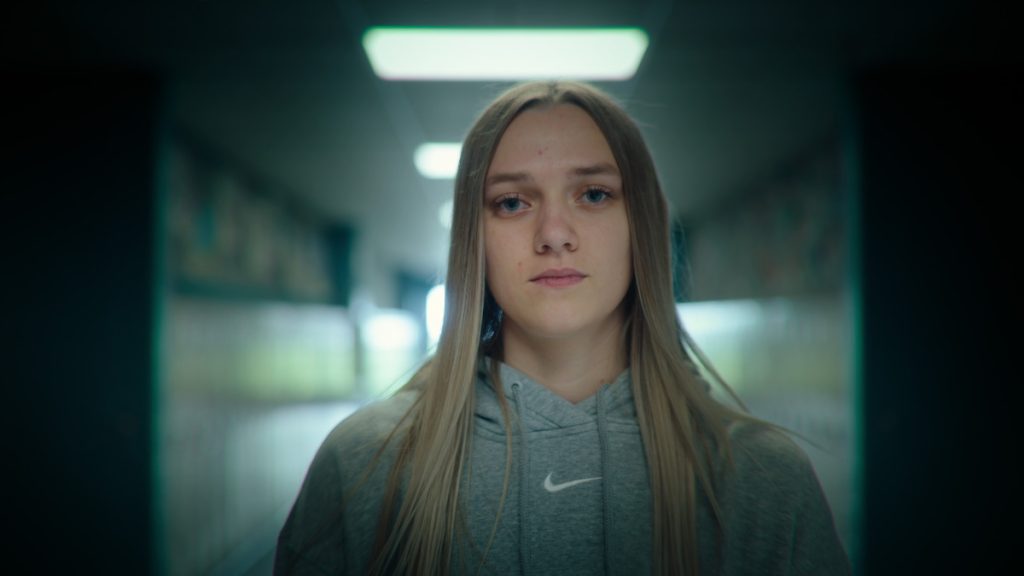Netflix’s latest true crime documentary Unknown Number: The High School Catfish has left viewers stunned, not just because of the chilling case at its core, but because of the heartbreaking family dynamic that unraveled in real time. Directed by Skye Borgman (Girl in the Picture, Fit for TV), the series peels back the layers of a cyberbullying saga that began in a quiet Michigan town — and ended with one of the most shocking reveals in recent true crime memory.
A Community Torn Apart
The story begins in October 2020, when 13-year-old Lauryn Licari and her boyfriend Owen began receiving disturbing texts from an anonymous number. The harassment stopped, then resumed in September 2021, escalating into a relentless 15-month barrage of threats and cruel messages.
What made the case especially unnerving was the insider knowledge behind the texts — details only someone close to Lauryn could know. As suspicion spread through Beal City High School, friendships frayed, and classmates turned on one another. Police investigations deepened the paranoia, leaving parents and teachers desperate for answers.
The Stunning Reveal
For months, investigators focused on Lauryn’s peers, convinced the harassment came from someone inside her circle. But when local police officer Bradley Peter partnered with the FBI, the digital trail led somewhere no one expected: Lauryn’s own mother, Kendra Licari.
The jaw-dropping reveal — captured on a bodycam as Sheriff Mike Main confronted Kendra and informed Lauryn — was the moment that turned this from a story of online bullying into a harrowing family tragedy.
Where Is Kendra Licari Now?
In December 2022, Kendra was arrested and charged with multiple counts of stalking and using a computer to commit a crime. She eventually pleaded guilty to two counts of stalking a minor and received a sentence of 19 months to five years in prison.
On August 8, 2024, Kendra was released. As of the conclusion of filming for Unknown Number, she expressed a desire to rebuild her relationship with Lauryn, though director Skye Borgman was clear about the uphill battle ahead:
“She’s remorseful that she has severely altered her relationship with her daughter in most likely a negative way… Will they have a relationship? Probably. Will it be the same? Absolutely not. There’s no way it can be the same.”
Why Would a Mother Harass Her Own Daughter?
That question lies at the heart of Unknown Number — and it’s one that neither Kendra nor the experts interviewed can fully answer.
In the documentary, Kendra recalls her own traumatic assault as a teenager, around the same age Lauryn was during the harassment. She described being terrified watching her daughter grow up, and she linked that fear to her decision to send the messages — a misguided attempt to keep Lauryn close.
Some observers, including school officials and prosecutor David Barberi, have likened Kendra’s behavior to a digital form of Munchausen syndrome by proxy — a disorder where a caregiver harms someone to gain attention or control. But Borgman cautions against reducing it to a simple diagnosis:
“To give it any sort of medical foundation is a little bit problematic. … But I think there are elements about Munchausen by proxy — about harming someone to keep them close — that definitely existed.”
The Lingering Aftermath
The Licari family’s ordeal doesn’t end with the credits. The scars of betrayal run deep, and the question of whether Lauryn and Kendra can rebuild even part of their bond remains unanswered. For viewers, the documentary raises broader questions too — about trust, digital abuse, and how far trauma can ripple across generations.
What’s next for the Licari family is uncertain. But one thing is clear: Unknown Number isn’t just a story of catfishing — it’s a haunting reminder of how easily the people closest to us can become strangers, and how the fallout of betrayal can echo long after the messages stop.


